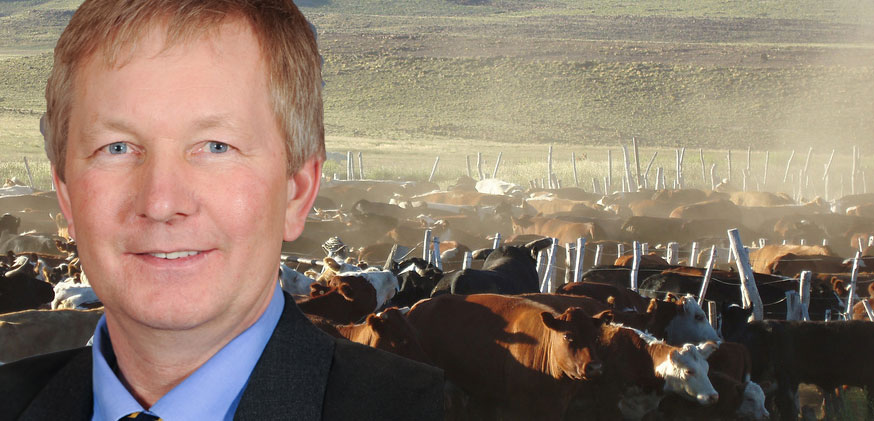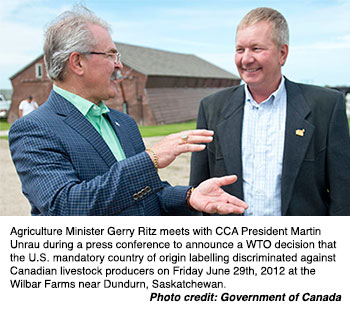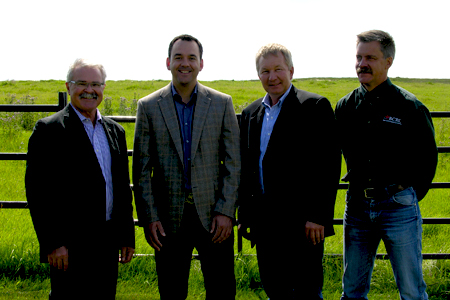Q&A with Martin Unrau: Lifelong Cattleman

Martin Unrau is a life long cattleman who is no stranger to the trade deal table, who has seen his share of committee meetings, and trade junkets abroad, and has been a proactive participant supporting and endorsing the cattle industry he has spent his life in
But it’s because of his first hand experience serving as CCA president, and now currently past president, that we wanted to talk with him about the latest hurdles in the COOL repeal process and the TPP negotiations. So, prior to his trip to Winnipeg for the Annual Canadian Cattlemen’s Association general meeting this week, he took time out to speak with us.
CMB: So, thanks for talking with us today. As you know it was announced now that the WTO is holding arbitration meetings in Geneva in September in response to The Office of the U.S. Trade Representative (USTR) submitting a brief claiming Canada and Mexico’s retaliatory tariff amounts are over dramatic and exaggerated. What is your thought on what only seems to be yet another stall in the repeal process?
MU: Well, first let me just say that in my capacity as president of the CCA for a number years and now currently past president, I’ve been very involved with COOL for some time. Even before my stint with CCA I was president of the Manitoba Cattle Producers, and even back then, we were going head to head with COOL. So, it really has been a long, drawn out process but at the end of the day, I feel we are winning the battle.
I’m not at all concerned about the arbitration in Geneva in September because I believe there could be the very real possibility of even retaliating at a higher level than what we’ve thought the retaliation amounts to be. After all economists, and that includes U.S. economists, have been saying that the retaliation amount is actually less than what it could be. So, at the very least after the WTO arbitration we will really know what the set amount will be. I really don’t think it’s going to tilt to favour the argument the way the U.S dept of trade hopes.
I really believe it’s up to the US to find some kind of way to get out from under this because retaliation is going to be very serious. Our government is onboard to get that implemented and there is going to be some serious consequences for congressmen and senators in the US because there are going to be some jobs lost. The repercussions to other industries that are trade dependent on Canadian exports are really going to suffer, and if we can get 100% tariffs slapped on their goods, it will put undo strain on those companies who could ultimately go broke or find themselves scrambling for new markets. So all those pro COOL congressmen and senators will ultimately have to answer to their constituents all because of their ridiculous stand to favour Country of Origin labelling.
CMB: So in your capacity with CCA and Manitoba Beef I assume you’ve rubbed elbows with Ritz and Fast at the multitude of COOL summits over the years.
MU: I’ve had so many meetings with Minister Ritz it’s unreal [laughs]. And let me state right here, I’ve really admired that Ritz and Fast are ministers who know what’s right and what’s wrong when it comes to trade.
CMB: It really is unfortunate that we’ve had to dig our heels in when we’ve had NAFTA for all these years.
MU: Yes. When you think back to when we agreed to certain aspects of our trade agreement as countries, we might not have liked some of the outcomes of the deal, but the bottom line is that we did agree to trade pacts and we have to stick to the agreements we made, and that is really the issue we’re fighting here. And let’s be clear, it’s not about us against the U.S. per se, but both countries agreed we wouldn’t put anything in place to impede trade. So when you look at Country of Origin labelling it absolutely messes with our trade of beef and pork into the U.S and that wasn’t part of the deal so now they have to be held accountable.
When you make a deal, you make a deal. It sounds simplistic I know but if you compare it to buying a product and agreeing to pay $500, then you take it home, try it out and decide ‘No, I’m only paying you $300 and by the way, I’m keeping it’, well that is ultimately what COOL is doing. So, they (the U.S) haven’t held up their end of the bargain.
CMB: So, in some ways, it’s similar to disagreements like we had with Soft Wood lumber.
MU: I’m not sure if we won a favourable outcome when the U.S didn’t adhere to their soft wood lumber agreement, but at least that one got resolved. Bottom line this is not a ‘we’re against them and they’re against us’ situation at all. They just have to uphold their end of the deal.
Agriculure Minister GerryRitz with Blake Richards, Martin Unrau, and Reynold Bergen
CMB: Okay, let’s jump to another trade deal since we’re on the topic of agreements. We’re you involved at all with any of the TPP meetings?
MU: Yes I was. As a matter of fact I was involved in the seat of negotiations with Europe over the TPP. I was in Singapore a couple of times last year and negotiations have shaped to a point where I feel we’re going to have a meaningful agreement for us in the beef trade. That’s my hope but if the deal gets signed there are definitely some good opportunities there for us in the TPP.
CMB: So, I’m going to paraphrase a bit here and do the rah rah Canada thing and proclaim our product to be pretty much bar none insomuch as setting the bar high when it comes to Canadian beef quality. Yet with all the issues that detract from successful trade ie; COOL, Russian bans, etc, etc, it seems like our beef trade, whether it be livestock exports or processed products, is just getting knocked around of late. From your side of the fence do you see that we’ve been hampered as bad as it seems in the press?
MU: Well, let me just say this; at the end of the day every trade agreement is extremely, extremely important for the red meat industry, whether it’d be beef or pork. So, I can only speak directly to the beef – although I should state I know a thing or two about pork as well because I know a lot of pork guys very well and was on trade missions with them and it’s just as important to them – but for us it’s absolutely imperative that we have trade deals. And the reason is simply because we as an industry in Canada produce more product than we can consume. In the cattle industry it’s even more important because every piece of meat – and this is crucial – really is a market within itself. In my way of thinking I don’t think of a fat steer as a fat steer; I think long cuts, prime cuts, livers, tongues and ears, and every one of those products is a market onto itself. So for me as a cattleman breeding livestock for export for instance, I want the guys negotiating on my behalf to get the most dollars for every piece of that animal that they can. So, to answer your question, without trade we die as an industry, that’s it, that’s the end of the story.
CMB: So then you must agree participation in McDonald’s Sustainability program, funding from government initiatives like Grow 2 Forward, and what Canada Beef is doing with the center of excellence are really imperative to our industry successfully promoting our product to those markets.
MU: Absolutely. It’s very important to our success but also we need the companies onboard. The JBS, the Cargills, and the small companies too like St. Helens and all those little guys out there, who really fill in some of that market that the bigger companies just can’t hit.
But it’s also about how we do things as industry participants in Canada.
CMB: What do you mean exactly?
MU: Well, we fight all the time [laughs]. The packers fight with the retailers and the cow calf guys fight with the feedlots, but at the end of the day regardless of our minor disagreements, each sector within the whole really tries hard to make things work.
For example I was in Australia two years ago and at that time their fat cattle were selling at about 65% of what ours was. So when you look at how they do things compared to how we do, were just in a far better position, not only because of all those initiatives you mentioned, but also because of how we work together and how we make things happen.














